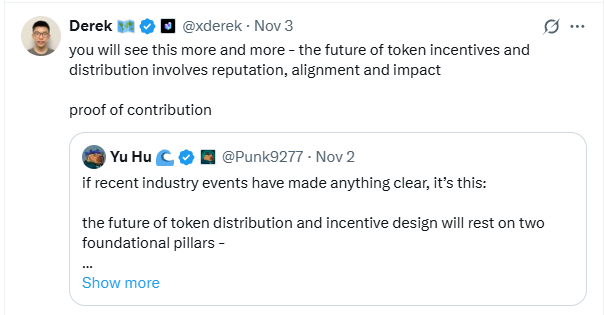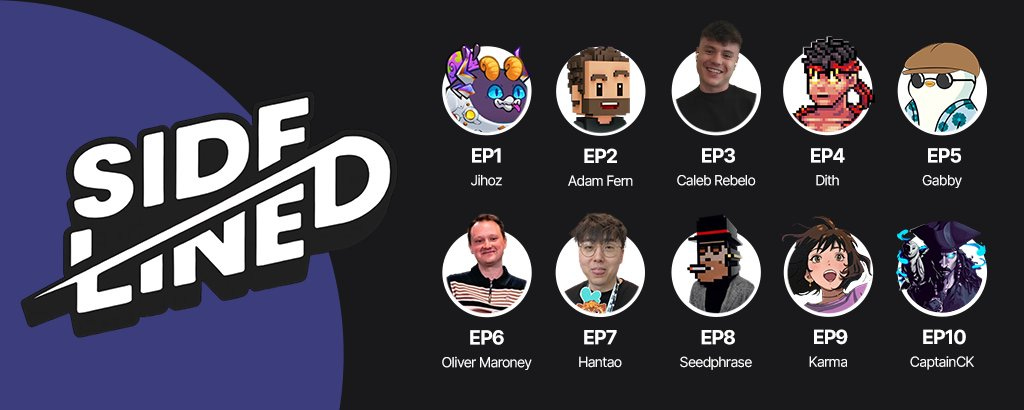"The future of token incentives involves reputation..."
GC ALPHA 73
Disclaimer: None of this information should be taken as financial advice. DYOR + I will hold some of the assets mentioned in this newsletter.
MARKET TALK
“PROOF OF CONTRIBUTION”
Last week, Fishing Frenzy released its whitepaper. The paper outlines Uncharted’s plans for "Proof of Contribution” (POC) and the FISH token. Let’s get into the why, what, and how of these new “experiments”
POC aims to solve inefficient token distribution (mercenary users receiving tokens, without adding value) through a reputation system and loyalty-based economics
“POC works by automatically assigning a reputation score for all users of an ecosystem or app based on their onchain and offchain behaviours”
Fishing Frenzy will serve as a case study for the POC-tech. Based on its success, the team will open up this standard to other projects (similar to its Creator Dashboard)
POC is engineered to create a growth flywheel:
Users contribute to receive a score (“Karma”) → contributions grow the app’s ecosystem and attract more users → the value of the app grows, and it can return more rewards to contributors
POC is the reputation system, Karma is the reputation score, and FISH is how players are rewarded
As a “core loyalty metric”, Karma measures players’ onchain (staking, balance changes, purchases, etc.) and offchain behaviors (content creation and in-game playtime)
The score is variable and can increase or decrease over time, depending on whether the player adds value or extracts it
Players with a high Karma score gain a multitude of perks, a % of game revenue (30% of all in-app purchases → FISH buybacks → rewards), taxes generated from withdrawals (100%), potential bonus emissions, among other (in-game) perks
Fishing Frenzy will also use an Apptoken, xFISH. This is a spend-only token that will be distributed for rewards. If players were to convert their xFISH into FISH (1:1), it would be automatically vested (100% unlock after 28 days). Furthermore, withdrawals are also taxed based on the player’s Karma score
The taxing rate is really aggressive for new users (95% in the lowest Karma bracket), disincentivizing selling. In the highest bracket, the tax = 0%, but selling FISH would also decrease your Karma score. So, it creates this interesting metagame of score optimization
On the tokenomics of FISH, there are a couple of interesting mechanics as well:
The token will use an FDV-based unlock model: “50% of initial community airdrop and 100% of the team allocation will only be unlocked if the token grows in price, to fully align incentives in growing the ecosystem”
So, for the airdrop, 50% will be unlocked at TGE, and then from $5M, an additional 10% will be unlocked, then at $10M, $15M, etc.
The team’s allocation will only unlock at a $25M FDV (25%) and fully unlock at a $200M FDV
FDV-based unlocks make a lot of sense in terms of creating an incentive for both parties to hold (and buy) the token. I think nobody was just willing to take the risk yet
Uncharted is aiming at something bigger than just introducing a gaming token with Fishing Frenzy. I salute this team for being willing to take the risks through these multiple, unproven experiments (a reputation system, Apptokens, FDV-based unlocks, etc.)
10 GUESTS AND 37 LESSONS FROM SIDELINED
Over the past few months, we’ve had 12 guests on Sidelined. Recently, I decided to summarize my favorite lessons and takeaways from the first 10 guests we had on. The article I posted on my Twitter includes all 37 lessons. This segment will be summarized, with 1 lesson from every guest on the show:
Jihoz - Ronin Network:
“If we can become the gamification layer of crypto, of Ethereum, that’s also a much larger market”
The thesis of gamification elements in consumer apps has proven itself. Gamified consumer is an enormous market, and has a lot of potential to carry over to crypto
Fern - Proof of Play:
“If you’re collecting revenue in a token that other people want to speculate on, if you collect it, and then you sell it, en masse”, followed up by “what happens to it when there’s no buy side pressure?”
Native-token-denominated revenue collapses if the Treasury becomes a net seller. This is why (some) revenue needs to be collected in stables
Caleb - FDF
“The most powerful thing is (financial) opportunity in the space, so we kind of mechanically built that into the system to how we launched players...”
The best apps inherently capture momentum. FDF turned early players into whales through aggressive bonding curves, which created this viral social sharing effect
Dith - Gigaverse:
“One of the reasons gaming tokens have the charts that they do is because they would bring players in such a way that doesn’t require any skin in the game”
Most token launches chased DAUs and vanity metrics, but lack systems to build long-term alignment
Gabby - YGG:
“That’s how I think you best do marketing within crypto...it’s to really extend your reach through other communities and make it feel like your own”
The best crypto marketing is bottom-up. There are distribution unlocks by attaching yourself to other (known) communities and making them feel like co-owners
Oliver Maroney - OpenSea:
“The teams that I see succeed in this space are the ones that understand it very well, first of all. Know that they have to be able to pivot swiftly if the market changes...”
Agility is an important part of the success equation (like Dith says)
Hantao - Moku:
“Success in crypto is closer to how Web2 does liveops,” and “it’s just about...how do you build momentum, and how do you keep rolling that up in something valuable”
In crypto, many teams know how to capture attention (”one defining moment”), but can’t convert it into retention. Success in crypto is about continuous cycles that compound
Seedphrase - Wolf Game:
“Previous management was very disjointed, right? They didn’t really know the community, and they didn’t really deliver what people wanted”
If you don’t understand your community’s culture, you lose it. Especially with niche CT-focused crypto games, community-product fit matters
Karma - Monad:
“The entire idea behind Monad Cards was not to rely on inputs from any external sources, etc., from a 3rd party. It was very much about giving the community... a voice to create that (social) graph by themselves”
By letting the community build the social graph, Monad Cards created an authentic experience and valuable social currency
CaptainCK - REACH
“Consistency is an important part of the success equation, but it really isn’t everything”
Consistency is only valuable if you consistently analyze, learn, and adapt
Overall, Raiden and I are happy with what we’re building and are excited to keep pushing the show forward by continuously improving
ON THE RISE
The Preseason for Moku’s Grand Arena starts in less than 1 hour
Coinbase is launching a platform for token sales, starting with Monad next week
Youmio testnet users can now apply for early access to the Youmio App






